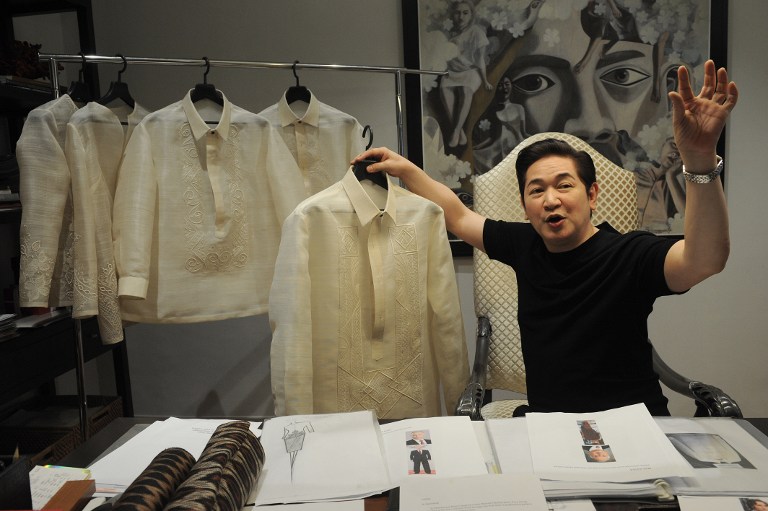
This photo taken on November 12, 2015 shows Filipino designer Paul Cabral explaining how he designed the “barong” or formal shirts that Asia-Pacific Economic Cooperation (APEC) leaders will wear during the summit this week in Manila. The twenty-two leaders of the Asia Pacific Economic Cooperation (APEC) will wear the “barong tagalog”, the Philippines’ formal shirt, with each garment custom-embroidered with their country’s symbols. Cabral is hoping to buck the trend with his creations, which took four months to design and sew painstakingly by hand. AFP PHOTO
MANILA, Philippines—Star Trek suits are out and pineapple shirts are in as the Philippines seeks to keep the world’s most powerful leaders off the list of global summit fashion train wrecks.
Boldly ignoring the ridicule levelled at past costumes, the Philippines is continuing the spotty tradition of dressing the heads of the Asia-Pacific Economic Cooperation (Apec) nations in the host country’s national garment.
Filipino designer to the stars Paul Cabral labored for four months creating a traditional “barong” shirt for each of the 21 APEC leaders, embroidered with individual symbols of their country.
The shirts, semi-sheer and partially made from pineapple fiber, will be worn at the summit opening in Manila on Wednesday.
But shaking off the APEC red carpet’s reputation as a worst-dressed parade will be a tall order for Cabral if past attempts are anything to go by.
Last year, the tunics worn by the leaders in China went viral on the Internet for resembling Star Trek uniforms.
READ: Apec leaders in Mao suits likened to Star Trek
In the aftermath of the global financial crisis in 2008, the ponchos worn by the leaders in Peru were ridiculed as potato sacks, while global power players looked visibly uncomfortable two years earlier as they shuffled onto the stage for a photo-op wearing Vietnam’s “ao dai” tunics.
READ: Economic crisis literally costs Apec leaders their shirts
The tradition harks back to 1993 when US President Bill Clinton put his Apec colleagues in leather bomber jackets — the kind worn by World War II fighter pilots.
The “barong Tagalog” holds a special place in a Filipino man’s closet, reserved for special events like weddings. It also serves as his burial shroud.
The cloth is made from the hard, spiked leaves from the pineapple’s crown, which are pounded and dried.
For the leaders’ shirts, Cabral mixed it with silk to make it more comfortable.
“This summit is the best showcase for the barong and for Filipino talent,” Cabral told Agence France-Presse at his atelier in Manila, as he marked the finished garments for delivery to the presidential palace.
“The whole world is your audience, nothing can be more grandiose than that.”
Cabral said he was confident that his design would not be the butt of jokes.
“I’m not at all worried. I just concentrated on my job,” he said.
Cabral said he studied the Apec leaders’ posture to come up with a design that both represents their country and suits their build.
United States President Barack Obama’s tall frame will be draped with bold patterns from American renaissance architecture, he said.
The shirt of China’s Xi Jinping features tall bamboo with cascading leaves while Malaysia’s Najib Razak boasts warrior shields from Sarawak.
But the most important detail in the shirts for those wearing them may not be the intricate embroidery. Cabral said he secretly sewed a satin lining on the tough collars to prevent itching.
“We want the leaders to be comfortable,” Cabral said.